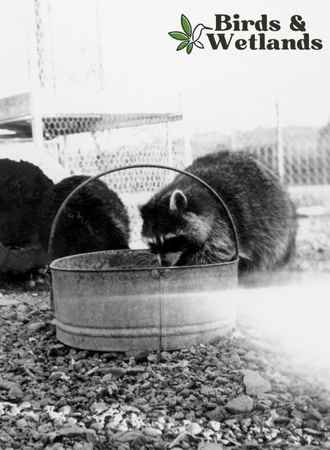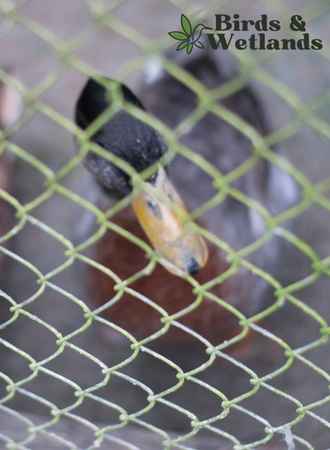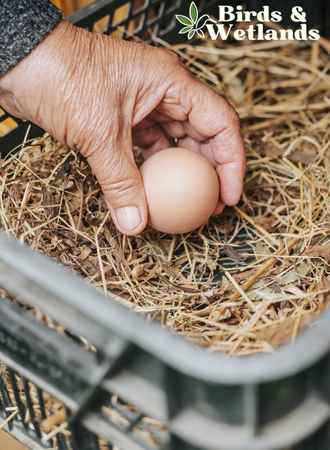Ducks are charming backyard birds but can also be vulnerable to predators. One of the most common predators of ducks is the raccoon.
So, how do we protect ducks from raccoons?
To protect ducks from raccoons, ensure your ducks are housed in a secure coop or enclosure during the night when raccoons are most active. The coop should have a sturdy, raccoon-proof latch, as these creatures are quite adept at opening simple latches. Use hardware cloth instead of chicken wire for fencing, as raccoons can reach through or break the latter. Also, clean up any leftover feed to avoid attracting raccoons.
Key Takeaways on How to Protect Duck Eggs, Ducklings and Adult Ducks From Raccoons
- Raccoons and other predators attack wild ducks and backyard ducks. These duck predators will also eat duck eggs and baby ducks.
- Raccoons will occasionally target a full-grown duck if they are hungry enough.
- Ducks should be secured in a sturdy coop or enclosure at night
- Use raccoon-proof latches on coops as raccoons are skilled at opening simple latches
- Prefer hardware cloth over chicken wire for fencing to prevent raccoons from reaching through or breaking it
- Clean up leftover feed to avoid attracting raccoons
Do Raccoons Eat Ducks?

Raccoons are notorious for preying on eggs and young animals so they won’t turn down an easy meal of duck eggs and ducklings if given the opportunity.
But can a raccoon kill an adult duck?
Yes, raccoons do eat ducks. Raccoons are omnivorous creatures with a varied diet, and they are known to prey on birds, including ducks, especially if the ducks are easily accessible. They typically go for the eggs but won’t shy away from attacking adult ducks. This is why it’s important to protect your ducks and their nests with secure housing, especially during the night when raccoons are most active.
How Do Raccoons Kill Ducks?
Raccoons have dexterous and nimble fingers, allowing them to manipulate objects easily and have a faster attack mechanism. Due to their preference to hunt at night, they have evolved into seeing even in low-light conditions.
When a raccoon sets its sights on a duck, it will typically employ an aggressive hunting strategy, inflicting damage on the prey with its dexterous hands and sharp claws.
After carefully and quietly entering the ducks’ cage, the raccoon will first target the most defenseless duck. This helpless bird may appear ill or disabled, or it could simply be the youngest with less experience defending itself against predators.
Its strong jaws and razor-sharp teeth will quickly remove a large portion of skin from the neck or head of the unfortunate duck. This attack renders it defenseless and immobile. The dead duck is then dragged away by the raccoon so it can escape with its prize and consume it later.
Will Raccoons Steal Duck Eggs?
Raccoons are notorious egg thieves and have also been observed stealing duck eggs. The dexterity of their paws allows them to crack open eggs without breaking them, allowing them to infiltrate even well-guarded coops and nesting boxes easily. Once inside a duck’s nesting area, raccoons steal every egg, leaving the poor birds with nothing to care for.
How to Keep Your Ducks Safe From Raccoons
Ducks are at the bottom of the food chain and are often defenseless against an attack from their natural predators. Raccoons eat meat and they will target ducks and chickens. So, here’s how to keep your flock from raccoon attacks.
Do’s and Don’ts of How to Protect Ducks From Raccoons
Dos
- Do Secure the Duck Coop: Make sure the duck enclosure is secure with no gaps or holes that a raccoon could exploit.
- Do Use Proper Locks: Install more complex locks, such as hook locks, on your coop doors. Raccoons have nimble paws and can open simple locks.
- Do Use Small Mesh Fencing: Use small mesh (about 1/2 inch) on your coop fence to prevent raccoons from reaching through.
- Do Install Motion Activated Sprinklers: These can startle and deter raccoons from approaching your duck area.
- Do Use Raccoon Repellents: Commercially available raccoon repellents can help deter raccoons. Always follow the instructions on the packaging.
- Do Regular Cleanups: Make sure to clean up any food or scraps that could attract raccoons to your property.
- Do Seek Professional Help: If your raccoon problem persists, consider hiring a professional pest control service.
Don’ts
- Don’t Leave Gaps in Enclosures: Raccoons are clever and persistent. Any gaps in the coop or fence can be exploited by them.
- Don’t Use Simple Locks: Avoid using basic sliding locks on your coop doors, as raccoons can easily open these.
- Don’t Use Wide Mesh Fencing: Larger mesh sizes allow raccoons to reach in and grab ducks or eggs.
- Don’t Leave Food Around: Avoid leaving food scraps or duck feed out overnight, as these can attract raccoons.
- Don’t Ignore Persistent Problems: If raccoons continue to be a problem, don’t ignore it. Seek professional help if needed.
- Don’t Assume Size Will Deter Raccoons: Don’t think that larger ducks or geese will be safe from raccoons. Raccoons can and will attack full-grown birds.
- Don’t Neglect Regular Monitoring: Don’t forget to regularly check on the ducks and their environment for signs of raccoon activity. Regular monitoring can help detect problems early before they become significant issues.
Block Any Gaps and Holes in Your Duck Coop and Fence

Raccoons are smart and capable animals. They only need about four inches to squeeze through gaps and spaces. The raccoon’s hands can easily slip through small holes. So, you should inspect your duck house, coop, and fences for any holes.
Seal any openings in your coop or fence to deny raccoons access to your helpless ducks. Without preventing access to these areas, raccoons can easily injure or kill your ducks.
Install sturdy wire mesh around the base of your coop and over any fence gaps. Alternatively, you can fill any gaps between the ground and the coop fence with concrete or rocks to keep raccoons from climbing over.
Sealing potential entry points is an effective preventative measure for keeping other animals out.
Install a Fence With a Smaller Mesh
Installing a small-mesh fence around your duck or chicken run is one of the most effective ways to keep them safe while they enjoy the outdoors. These cunning predators are notorious for their ability to break into coops, and even a well-built enclosure can be breached if it is not properly secured.
However, you can effectively prevent raccoons from entering your duck pen by using a fencing material with a small mesh size. The tiny holes in the fencing material are too small for their paws or claws, so would-be thieves cannot access your feathered companions.
Attach Your Coop to the Ground
Raccoons are good diggers. Therefore, one of the best ways to protect your ducks from these intelligent predators is to secure your duck coop to the ground. You can achieve this by excavating deep post holes and attaching the coop with heavy steel cables or sturdy stakes.
Securing your coop below ground creates a formidable physical barrier that raccoons will have difficulty surmounting. This method adds extra protection and deters common predators such as dogs, wolves, snakes, foxes and coyotes and other small animals.
TRIXIE Pet Products Natura Duck Coop
Are you looking for a reliable, safe, and accommodating living space for your ducks? The TRIXIE Pet Products Natura Duck Coop is the perfect abode that combines function, comfort, and durability, ensuring your ducks enjoy their surroundings.

Pros
- Spacious Design: The TRIXIE Pet Products Natura Duck Coop provides ample space for your ducks to roam and rest comfortably, promoting their well-being and happiness.
- Convenient Cleaning: With a pull-out plastic tray, this duck coop makes cleaning a breeze, helping maintain hygiene without the usual hassles.
- Robust Construction: Made of glazed pine, this coop is built to withstand the elements, ensuring a long-lasting and sturdy home for your ducks.
- Security: The hinged roof with locking arm can be opened from above, providing easy access while also ensuring your ducks’ security against potential predators.
- Easy Assembly: With all necessary hardware included and a detailed instruction guide, setting up your TRIXIE Pet Products Natura Duck Coop is a simple and straightforward process.
Cons
- Size Limitation: While the TRIXIE Pet Products Natura Duck Coop offers ample space, it may not be suitable for a large flock of ducks. Owners with a significant number of ducks may need to consider additional or larger housing options.
- Lack of Insulation: The design of the coop may not provide adequate insulation in extremely cold climates. Additional measures may be necessary to keep your ducks warm during harsh winters.
Only Let Your Ducks Out During the Day
You can reduce the risk of your ducks being attacked by limiting their outdoor time. By only releasing them during the day, when raccoons are inactive, you significantly reduce their chances of encountering these ferocious invaders.
Closing your enclosure and coop door with hook locks at night will prevent raccoons from sneaking in and stealing your cherished flock. Taking these simple precautions and safety measures, you can keep your ducks safe and secure with hooks locks while allowing ample space to roam and play.
Remove Eggs Regularly

When raising ducks, duck keepers must pay close attention to their flock’s nesting and breeding habits. If left unchecked, raccoons pose a significant threat to your ducks, consuming both young ducks and eggs.
By regularly removing eggs from the nest, you not only reduce the likelihood of egg loss due to predation, but you also reduce the likelihood of baby ducks falling victim to raccoon attacks. You can also use these eggs as a live trap to attract raccoons and relocate them.
Use Raccoon Repellents
Raccoon repellents are an effective tool for deterring these persistent creatures from your property. They come in various forms, such as sprays, granules, and electronic devices. Sprays and granules typically contain substances like capsaicin or predator urine that raccoons find unpleasant.
These repellents can be applied around the perimeter of your duck enclosure or in areas where raccoon activity has been noticed. Electronic repellents, on the other hand, use lights or ultrasonic noises to scare off raccoons.
It’s important to note that these repellents should be used as part of a comprehensive raccoon prevention plan and not as a standalone solution.
Redeo Solar Nocturnal Animal Repeller
Your Guard Against Predatory Invaders
Keep nocturnal predators at bay with the Redeo Solar Nocturnal Animal Repeller. This unique, solar-powered device is designed to protect your farm, garden, or chicken coop from unwanted visitors such as coyotes, foxes, raccoons, and more, offering an effective and humane method of wildlife control.

Pros
- Humane Deterrent: The Redeo Solar Nocturnal Animal Repeller uses red LED lights to mimic the fire and eyes of large predators, effectively deterring wildlife without causing them harm.
- Energy-Efficient: Powered by solar energy, this device charges during the day and operates at night, making it an environmentally friendly option.
- Easy to Install: The repeller is simple to set up and requires minimal maintenance. It can be mounted on a post, fence, or wall to deter predators.
- Waterproof Design: Rated at IP44, the repeller can withstand all weather conditions, making it suitable for year-round use.
- Versatile Usage: The repeller is effective against a variety of nocturnal animals, including coyotes, foxes, raccoons, and more, making it a versatile addition to any garden, farm, or livestock area.
Cons
- Limited Efficiency During Poor Weather: In prolonged rainy or cloudy weather, the solar-powered device may not charge adequately, potentially affecting its performance.
- May Deter Desired Wildlife: While it’s excellent at repelling unwanted animals, it may also deter desirable wildlife from your garden or property.
Clean Your Ducks’ Feeding Area Regularly
To prevent raccoons from attacking your ducks, you must regularly remove uneaten food and clean the feeding area. This routine will reduce the attraction of pests such as raccoons and protect the ducks’ health by minimizing their exposure to pathogens and contaminants in decaying food.
Keeping ducks away from dirty feeders and bowls can help prevent the spreading of diseases and parasites such as roundworms.
Best Overall Duck Feeder -FeatherEase Automatic Chicken Waterer & Feeder
Simplify Your Poultry Care with One Smart Solution!
Enhance your poultry care with the FeatherEase Automatic Chicken Waterer & Feeder, a convenient and efficient solution designed to keep your ducks and chickens well-fed and hydrated.

Pros
- Simplify your poultry care routine: Dual-function design combines an automatic waterer and feeder in one convenient unit.
- Save time and effort: Large feeder and waterer capacities reduce the need for frequent refill.
- Save money: Innovative no-waste feeding system minimizes feed spillage and waste.
- Long lasting: Food-grade, BPA-free materials ensure the safety and health of your poultry, while the durable constructio.
- Easy-to-assemble and maintain design simplifies the process of keeping your poultry hydrated and well-fed.
Cons
- Users with hard water may experience difficulty in separating the inner cup from the main cup of the waterer due to mineral buildup.
- The feeder’s holes may be too large for some users, allowing chickens to scatter food out, which could result in waste.
- The waterer may not function effectively in colder climates, requiring alternative solutions during the winter months.
- Awareness of Predatory Nature: Recognize that raccoons are indeed predators of ducks. They can kill and eat ducks of any size, even full-grown ones, and are also known to steal duck eggs.
- Secure the Duck Enclosure: Ensure your duck coop is secure with no gaps or holes. Raccoons are clever and can widen small gaps to gain access. A solid wall or fence around the cage could help deter raccoons.
- Use Proper Locks: Raccoons have dexterous paws, so using more complex locks on your coop doors, like hook locks, can prevent raccoons from gaining access.
- Use Small Mesh Fencing: Utilize smaller mesh on your coop fence to prevent raccoons from reaching in and grabbing ducks or eggs. A mesh size of about 1/2 inch is recommended.
- Relocate Ducks and Eggs if Necessary: If raccoons persist, consider moving the ducks or their eggs to a new location away from the raccoons’ reach.
- Install Motion Activated Sprinklers: Motion activated sprinklers can startle and deter raccoons from approaching your duck area.
- Use Raccoon Repellents: Commercially available raccoon repellents can help keep raccoons at bay. However, remember to use them wisely and follow the instructions.
- Avoid Leaving Food Around: Clean up any food or scraps that may attract raccoons to your property.
- Invest in Professional Help: If your raccoon problem persists despite your efforts, it might be beneficial to hire a professional pest control service.


